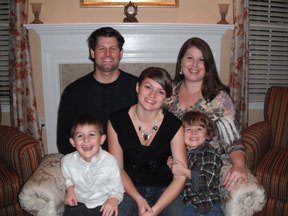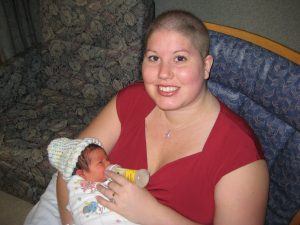At 20 weeks pregnant, Jackie Davies was feeling great. Now into her second trimester, her energy had returned and her pregnancy was progressing right on schedule. The 29-year-old Washington Township resident was already mother to an active 2-year-old boy, and she was busy finishing her bachelor’s degree and working as an administrative assistant for the New Jersey Department of Environmental Protection.
Despite her healthy pregnancy, she was somewhat worried about an inflamed, red area on her right breast. “It looked like a rash. I didn’t have any pain or a fever, but I knew something was wrong,” says Davies. “At first I thought that maybe there was some sort of blockage in my milk ducts.”
She pointed out the abnormality to her obstetrician, who sent her to a specialist. “The minute the specialist saw it, she was concerned. She did a biopsy right away,” says Davies. “I had the biopsy on a Monday, so that entire week was pretty awful because we had to wait until Friday for the results. I was freaking out, because deep down I knew it was something serious just from her mannerisms during the biopsy.”

Cancer-free for four years, Davies and her husband Brad, son Evan, stepdaughter Brooke and son Kaelan celebrate Christmas in 2011
The news that Friday confirmed the unthinkable – at roughly five months pregnant, Davies had Stage III inflammatory breast cancer. “We immediately met with a breast surgeon to talk about a plan of action. Everything was just a blur during that appointment. It’s a good thing my mom and husband were there with me, because I wouldn’t have remembered anything otherwise.
“That same day, the doctor scheduled an ultrasound to see how the baby was doing. We found out we were having another boy. On one hand, we were so happy because he was healthy and perfect. On the other hand, we just found out that I had breast cancer. It was just a topsy-turvy day of emotions,” says Davies.
“When I was at this point during my pregnancy with my older son, my husband and I were thinking about baby names, what the baby would be like and the type of parents we would be. Suddenly, I was worrying if I would even see my second son be born or see him reach his first birthday.”
Diagnosis and Treatment
Cancer occurs in roughly one out of every 1,000 pregnancies, and the incidence of the disease occurring during pregnancy is rising, says Elyce Cardonick, MD, a maternal-fetal medicine specialist at Cooper University Hospital. “Older women are more likely to have cancer, and as more women are going through pregnancy later in life, the likelihood of developing cancer while pregnant increases,” she explains.
A recent study from the National Cancer Institute confirms this progression: it found that among women 35 and younger with cancer, 14 percent were pregnant when their illnesses were diagnosed. Likewise, an American Cancer Society study of women under 45 found that 7 percent were pregnant at the time of diagnosis.
The most common cancers discovered during pregnancy are the same types that typically affect women of reproductive age – breast cancer, Hodgkin’s disease, cervical cancer and malignant melanoma – and the symptoms are often the same, explains Cardonick. However, she says pregnant women “might not disclose these symptoms to their doctor because they’re worried the doctor might suggest they terminate the pregnancy.
“If you have symptoms, bring it to your doctor’s attention. The best thing for your baby and your family is for you to be healthy – just because you’re pregnant and have cancer doesn’t mean you have to terminate. Women and doctors need to know it’s possible to successfully treat cancer while continuing a pregnancy,” she continues. “The worst thing you can do is to avoid treatment and then die when your baby is 18 months old.”
In most cases – and to the disbelief of many – oncologists actually treat the patient as if she’s not pregnant. This may mean surgery and even radiation or chemotherapy. “Understandably, women have a lot of anxiety when they’re told they need chemo during pregnancy,” says Cardonick. “They go from being told they can’t take anything stronger than Tylenol, and then suddenly we’re telling them they have to expose their baby to all these chemicals. It’s scary, but research shows that we can provide treatment while protecting both the baby and the mother.”

Cancer patient Jackie Davies holds her healthy son the day after he was born. Of the photo, Davies says, “Even though I look ridiculous, I think of this as my ‘take that, cancer!’ picture.”
This news was encouraging for Davies, but she still had fears. “The thought of exposing my baby to chemo was terrifying. I kept worrying about how it would affect him,” she says.
Cardonick maintains the Pregnancy and Cancer Registry, which since 1997 has compiled information on nearly 300 pregnancies in women with cancer. The registry is also following nearly 250 mothers and children over the long term.
Findings from her studies and others support treating women while they are pregnant: In general, children prenatally exposed to chemotherapy do not appear to have higher rates of birth defects or developmental abnormalities than other children.
When creating a treatment plan, doctors first look at the type of cancer and the stage of the pregnancy, explains Geeta Chhibber, MBB, a clinical associate professor of obstetrics and gynecology at UMDNJ-SOM. “You want to avoid chemo during the first three months of pregnancy because this is a critical time for development. However, chemotherapy administered during the second and third trimesters is typically safe,” she says. “Likewise, diagnostic radiology is generally ok, but therapeutic radiology can be detrimental.”
If surgery, such as a mastectomy or lumpectomy, is recommended, Cardonick says the sooner, the better. “The best time for surgery is right away, no matter the trimester. The risk of complications from the cancer is greater than the risk to the pregnancy.”
In Davies’ case, her doctors got her started on a chemotherapy regimen right away to slow the growth of the cancer. “I had five treatments over three months. Just as I started to feel good after one round, I would have to go back. Being pregnant, I was doubly tired,” she says.
As expected, pregnant patients undergoing chemotherapy are required to see their obstetrician more frequently than cancer-free patients, says Chhibber. “We will conduct serial ultrasounds to monitor the growth and development of the baby, and we’ll also do heart rate testing on a regular basis to make sure everything stays on track.”
Pregnancy does require one major adjustment to normal chemotherapy schedules, says Chhibber. “Chemo should not be given after the 34th week of pregnancy, because if the patient goes into labor while her white blood cell counts are low, the baby could be born with serious complications.”
Since chemo must be stopped before the pregnancy reaches full term, doctors often elect to induce patients to prevent a potentially dangerous lapse in treatment. “I was induced at 37 weeks because my doctors didn’t want to wait too long for the next round of chemo,” says Davies. “My son was born in just four minutes. He was so tiny – he weighed just 5 pounds – but otherwise he was perfect.” One week later, Davies was again receiving Taxol, a chemo drug specifically designed to treat breast cancer.
After that, Davies elected to have a bilateral mastectomy as a preemptive strike against future cancer. “I had a complete response to the chemo during pregnancy, but I still had to undergo eight more weeks of chemo after surgery and then six weeks of radiation,” she says. “All in all, I was undergoing treatment for 15 months. One of the hardest things was that I feel like I didn’t get to bond with my son as quickly, because I was going through so much. I still struggle with that.”
Davis says she also struggled with the fact that she couldn’t breastfeed her son. Although cancer cells can’t pass to infants through breast milk, doctors often advise women who are being treated for cancer not to breastfeed for four weeks following delivery, says Cardonick. “After that, supply might be an issue, and they might have to supplement with formula. Not everyone has this issue, but low milk production seems to be the trend.”
Life After Pregnancy and Treatment
Davies’ son is now 4 years old, and she says he’s hit all of his developmental milestones right on target. Part of Cardonick’s work with the Pregnancy and Cancer Registry includes following women who have been treated for cancer during pregnancy and their children. “We want to track the development of these children for years. We follow up with their pediatricians every year to get data on their milestones, mean weight, any medical problems they might have and any special services they may need,” she says. “We want to have more data about the long-term development and affects that chemo may have on these kids.”
The Pregnancy and Cancer Registry also tracks the progress of women after their treatment and postpartum period. “We’ve found that some women who have been treated for cancer during pregnancy can go on to have more kids. So far, 34 of our patients in the registry have gone on to have 40 healthy babies in total,” says Cardonick.
Though the data shows a positive outcome for many pregnant women who have battled cancer, doctors caution against rushing into another pregnancy. “If you’ve had cancer, you should wait at least a year – perhaps two – before trying to get pregnant again,” says Chhibber. “There is often an early reoccurrence of cancer for many patients, and we always want women to be healthy first and foremost before taking that step.”













